★½
“Someone should go Black to basics.”
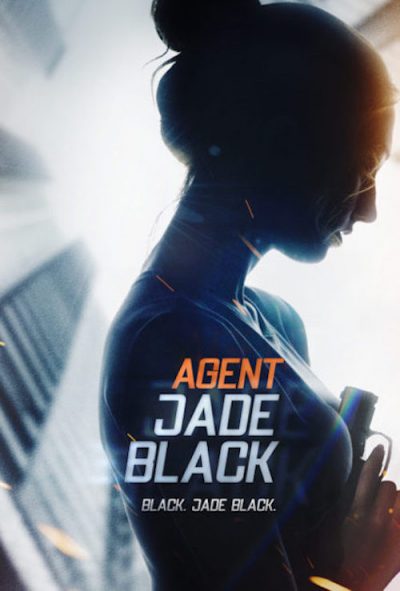 This originally was going to be included in my preview for the year, since it showed up in the IMDb with a release date of January 7, 2020. But on Googling, I found it already had seeped out on Tubi, a free movie channel. At time of writing, this would appear to be the first review written about it anywhere, though it should be considered less a preview than a dire advance warning. Indeed, I could condense the whole thing into one word: “Don’t.” For a more pedestrian, poorly-executed excuse for an action film, you’d be hard pushed to find. Right down to the initials of its lead character and the tag-line on the poster (right), this possesses aspirations it fails miserably to achieve. On the plus side, 2020 can really only go up from here.
This originally was going to be included in my preview for the year, since it showed up in the IMDb with a release date of January 7, 2020. But on Googling, I found it already had seeped out on Tubi, a free movie channel. At time of writing, this would appear to be the first review written about it anywhere, though it should be considered less a preview than a dire advance warning. Indeed, I could condense the whole thing into one word: “Don’t.” For a more pedestrian, poorly-executed excuse for an action film, you’d be hard pushed to find. Right down to the initials of its lead character and the tag-line on the poster (right), this possesses aspirations it fails miserably to achieve. On the plus side, 2020 can really only go up from here.
Jade Black (Burgess) is a globe-trotting agent, working for a clandestine department of the US government under her boss, Malcolm (Flack). Initially tasked with bringing a scientist in from Italy, that mission goes pear-shaped, and the target killed. His laptop survives, and opens the door to a looming plot. He was working on a biological weapon known as “Juliet”, triggered by chemicals the body releases during sex. The shadowy Darrian group are plotting to use this, and the related antidote, for… the usual nefarious purposes in which shadowy groups in C-grade movies engage, including the release of Juliet at a political fundraiser. Front and center in opposition to Jade is Darrian operative Elle (Franklin), another former acolyte of Malcolm. Like Jade, she was rescued by him from sex traffickers as a teenager. Only, in Elle’s case, the psychological damage suffered was too great to overcome, and she went rogue instead.
The above actually sounds kinda interesting – certainly, considerably more so than it is in execution. Part of the problem is the resources are incapable of delivering anything the script asks of them. “Italy” for example, appears entirely depicted by the scientist using an espresso maker. There’s not even any token stock-footage of Rome. When your film is shot entirely in Oklahoma, why mention Italy at all? This kind of ludicrous over-reach peppers the whole movie, considering it can only depict Malcolm’s office by tacking a couple of maps to the wall of a generic room. Spears’ direction is also terrible, though it may be more of an editorial issue. Both individual shots and entire scenes appear to have been cut with a blunt butter-knife, ending too soon or going on too long.
There’s absolutely no rhythm or pacing, with the film lurching and juddering from one moment to the next, and the players exchange one-liners that are less groan-worthy than induce actual nausea. It rapidly becomes painful to watch, despite the best efforts of the cast, who aren’t as relentlessly terrible as the direction or writing. Franklin comes out best, sinking her teeth effectively into her bad-girl role. But you could have had Meryl Streep in this, and she would have been unable to salvage it.
Dir: Terry Spears
Star: Katie Burgess, Sidney Flack, Connie Franklin, Taylor Reich





 I wanted to like this more than I did: director Skiba is a veteran of the Arizona film scene, though his other film previously covered here,
I wanted to like this more than I did: director Skiba is a veteran of the Arizona film scene, though his other film previously covered here, 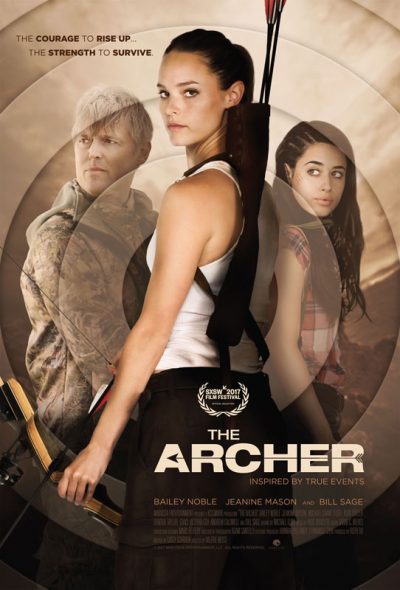 Lauren Pierce (Noble) is an expert archer, leading her high-school team. However, after she rescues a friend from sexual harassment, she finds herself on the wrong side of justice, and is sent to “Paradise Trails”, an incongruously-named juvenile detention facility, where harsh discipline and indefinitely extended sentences are the order of the day. And wouldn’t you know it, the place is run by a former Olympic archer – Bob Patrice (Sage) and his creepy son, Michael (Terry). It’s not long before Lauren is plotting an unofficial departure, along with new friend Becky (Mason), who knows the truth about what’s going on behind the scenes. When they get evidence proving it during their exit, they become the hunted as Bob and Michael will go to any lengths to stop the truth from getting out.
Lauren Pierce (Noble) is an expert archer, leading her high-school team. However, after she rescues a friend from sexual harassment, she finds herself on the wrong side of justice, and is sent to “Paradise Trails”, an incongruously-named juvenile detention facility, where harsh discipline and indefinitely extended sentences are the order of the day. And wouldn’t you know it, the place is run by a former Olympic archer – Bob Patrice (Sage) and his creepy son, Michael (Terry). It’s not long before Lauren is plotting an unofficial departure, along with new friend Becky (Mason), who knows the truth about what’s going on behind the scenes. When they get evidence proving it during their exit, they become the hunted as Bob and Michael will go to any lengths to stop the truth from getting out. This dates back from 2005, before Carano was a household name in the world of mixed martial arts, or a somewhat successful actress. At this point, she was only involved in the sport of muay thai, which as it’s name suggests, is a martial art originating in Thailand. She was one of five girls training in Las Vegas under Toddy – a nickname given because the teacher’s real name of Thohsaphol Sitiwatjana was too unpronounceable to Westerners! The goal of both Toddy and his students was a trip to Thailand to take on the best local practitioners of the sport. This “documentary” covers both their training and the visit itself, climaxing with Carano’s battle against the Thai champion.
This dates back from 2005, before Carano was a household name in the world of mixed martial arts, or a somewhat successful actress. At this point, she was only involved in the sport of muay thai, which as it’s name suggests, is a martial art originating in Thailand. She was one of five girls training in Las Vegas under Toddy – a nickname given because the teacher’s real name of Thohsaphol Sitiwatjana was too unpronounceable to Westerners! The goal of both Toddy and his students was a trip to Thailand to take on the best local practitioners of the sport. This “documentary” covers both their training and the visit itself, climaxing with Carano’s battle against the Thai champion.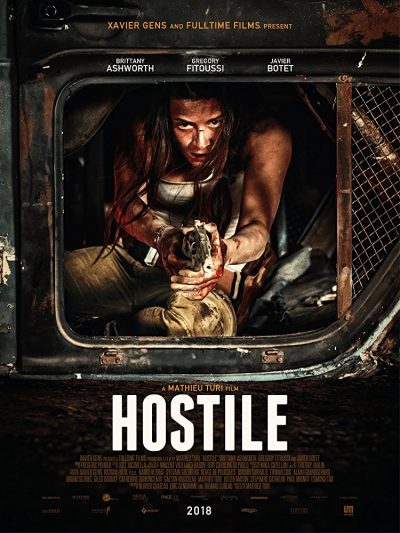 After an un-specified global apocalypse, humanity is reduced to small bands of scattered survivors, who have to try and scratch out survival, while avoiding the attacks of “reapers”, mutated creatures which stalk the landscape, especially after dark. One of those survivors is Juliette (Ashworth), who is on a foraging mission in the desert when an accident throws her off the road, and leaves her with a badly-broken leg. She has to wait for help to arrive, fending off the reaper (Botet) which is prowling the area, with whatever she can find to hand. As she does so, she thinks about life before the apocalypse, where she escaped drug addiction with the help of her boyfriend, gallery owner Jack (Fitoussi) – only for happiness to be fleeting, and taken away from her when multiple tragedies strike.
After an un-specified global apocalypse, humanity is reduced to small bands of scattered survivors, who have to try and scratch out survival, while avoiding the attacks of “reapers”, mutated creatures which stalk the landscape, especially after dark. One of those survivors is Juliette (Ashworth), who is on a foraging mission in the desert when an accident throws her off the road, and leaves her with a badly-broken leg. She has to wait for help to arrive, fending off the reaper (Botet) which is prowling the area, with whatever she can find to hand. As she does so, she thinks about life before the apocalypse, where she escaped drug addiction with the help of her boyfriend, gallery owner Jack (Fitoussi) – only for happiness to be fleeting, and taken away from her when multiple tragedies strike.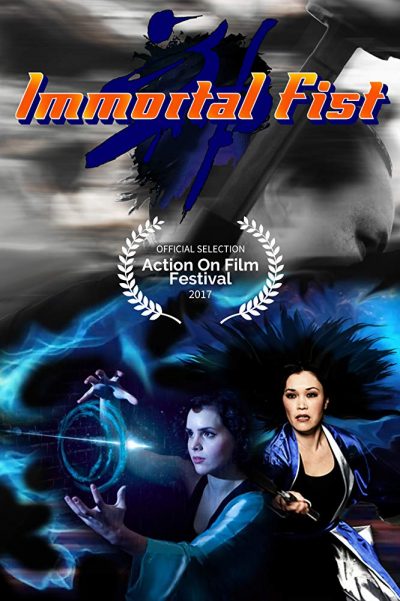 The above quote does suggest that the makers here appreciate how ridiculous the entire thing is. And that self-awareness may be the main thing which saves this from being largely cringeworthy. Just because you
The above quote does suggest that the makers here appreciate how ridiculous the entire thing is. And that self-awareness may be the main thing which saves this from being largely cringeworthy. Just because you 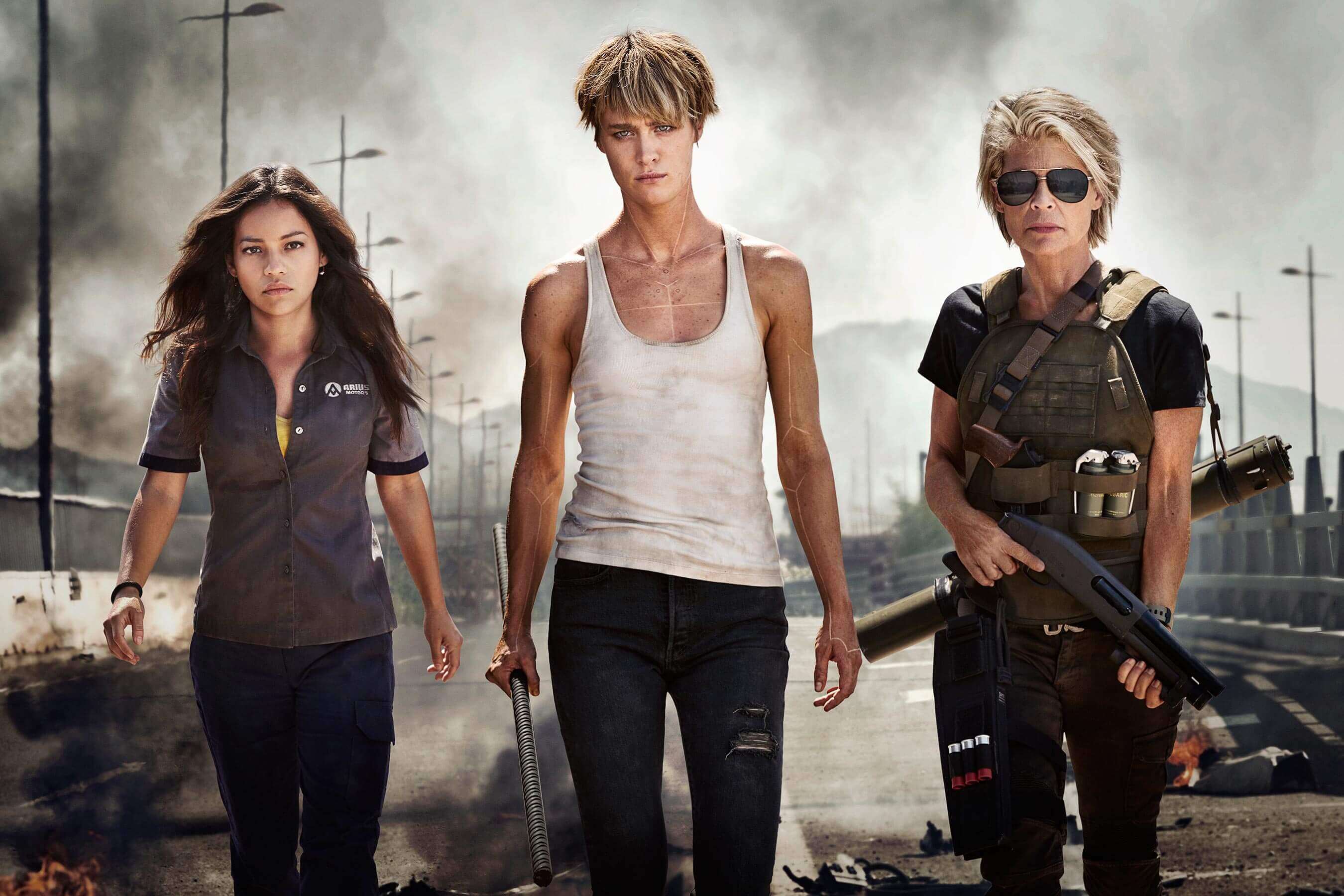 ★★½
★★½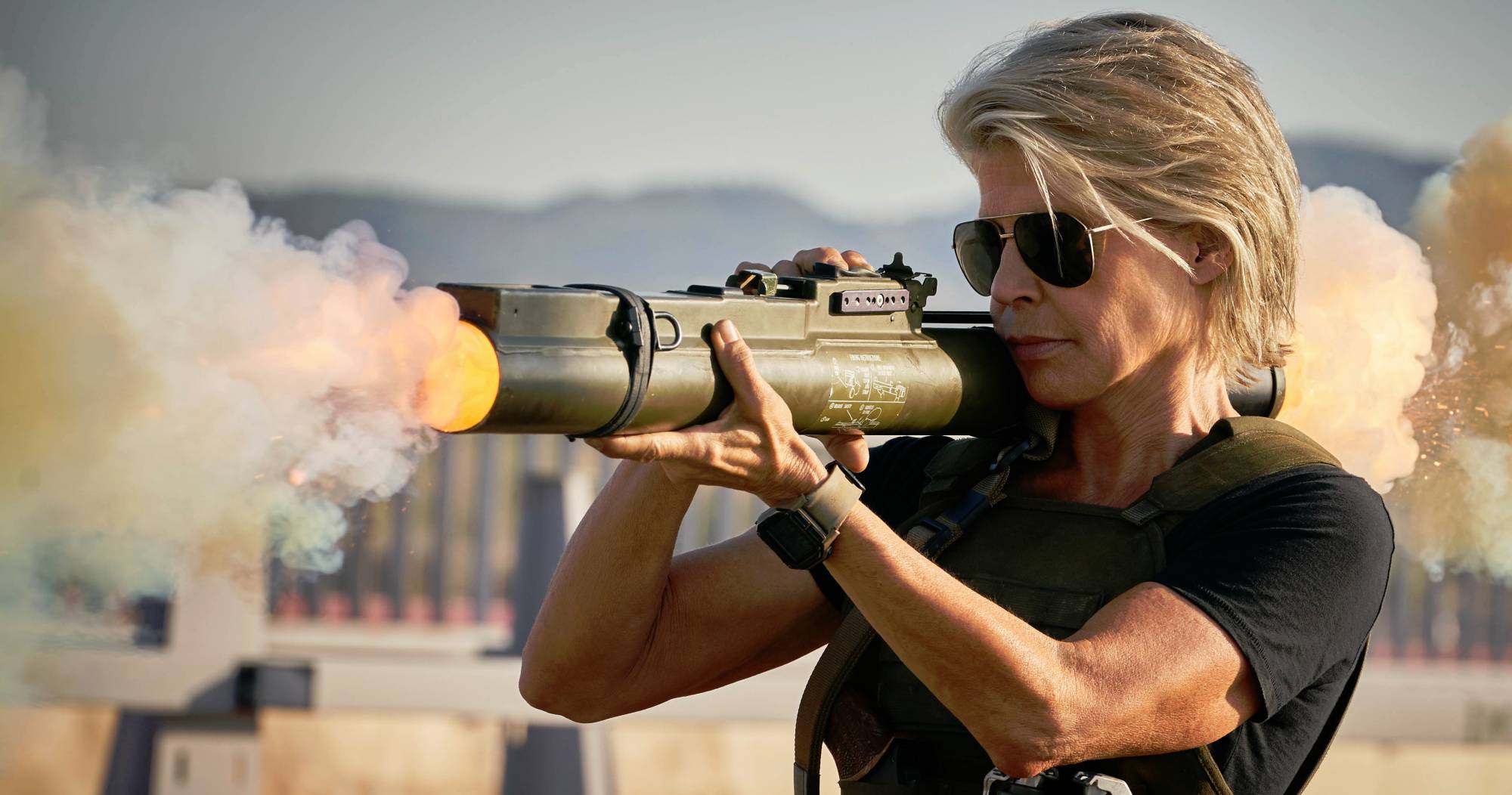
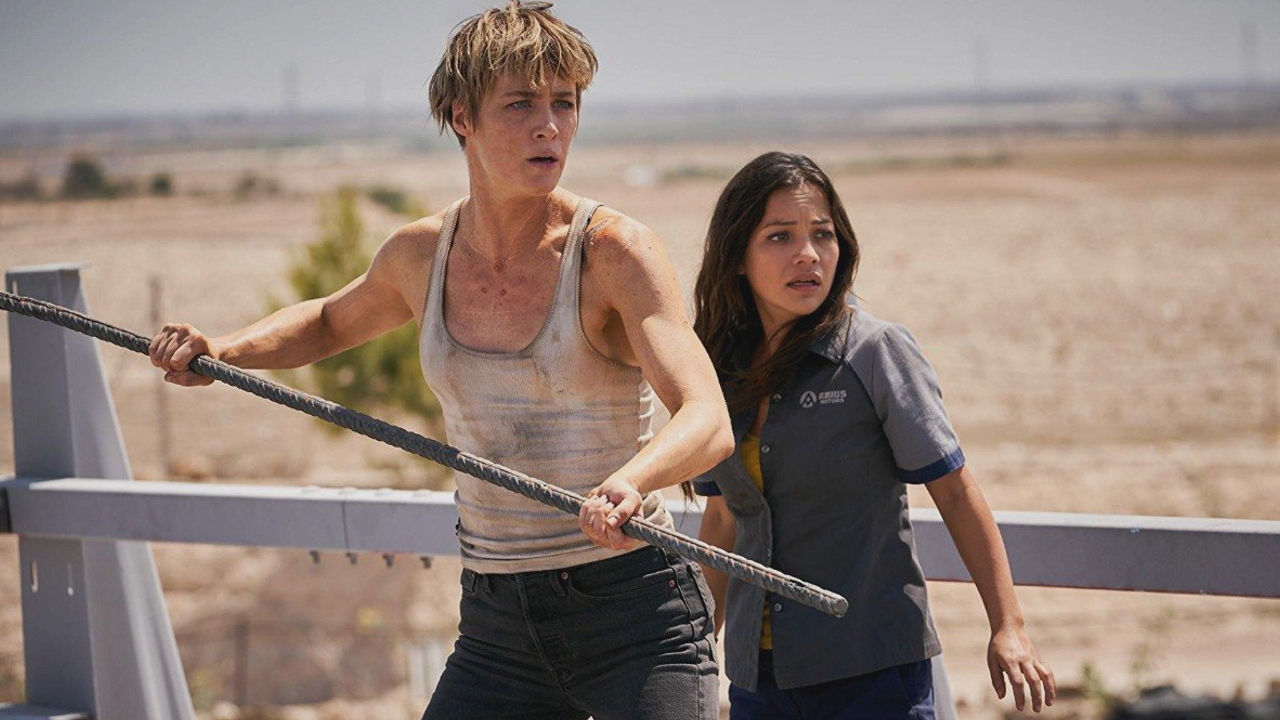
 Either by intent or accidentally – and we’ll get to that in a moment – this manages to be both an indictment of and an advert for, American gun culture. That’s quite a spectacular achievement, and it’s perhaps no coincidence that the writer/director is British, so brings an outsider’s balanced eye to a topic that’s often acrimonious in the States. Kathleen Sullivan (Young) is a teacher who has just moved from Boston to a small Texas town. She falls for local attorney Larry Keeler (Day), though is only interested in friendship, not a significant relationship. The initially-charming Larry eventually won’t take no for an answer, and date-rapes Kathleen. However, the circumstances and her attacker’s local reputation mean she gets no satisfaction from the police. The meek and mild Kathleen decides to take matters into her own hands, buying a gun and taking up combat shooting – at the very same club Larry frequents – with the aim of meting out her own brand of justice.
Either by intent or accidentally – and we’ll get to that in a moment – this manages to be both an indictment of and an advert for, American gun culture. That’s quite a spectacular achievement, and it’s perhaps no coincidence that the writer/director is British, so brings an outsider’s balanced eye to a topic that’s often acrimonious in the States. Kathleen Sullivan (Young) is a teacher who has just moved from Boston to a small Texas town. She falls for local attorney Larry Keeler (Day), though is only interested in friendship, not a significant relationship. The initially-charming Larry eventually won’t take no for an answer, and date-rapes Kathleen. However, the circumstances and her attacker’s local reputation mean she gets no satisfaction from the police. The meek and mild Kathleen decides to take matters into her own hands, buying a gun and taking up combat shooting – at the very same club Larry frequents – with the aim of meting out her own brand of justice.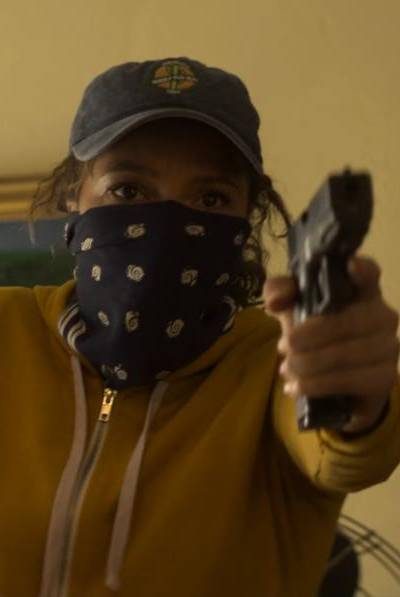 This occupies a rather odd middle-ground between a meditation on what it means to take a life, and a violent thriller. I’m not sure it manages to pull either off entirely successfully, yet some striking imagery helped sustain our interest. Katrina (Ejogo) is driving from Phoenix to Oklahoma City, with her young daughter, Clara (Pratt), to start a new life: it’s hinted that there may be an abusive partner in the rear-view mirror. The route takes her across the Texas Panhandle, and in an effort to avoid a traffic jam, she hits the back roads. This turns out to be mistake, as she first gets a flat, then Clara is bitten by a rattlesnake.
This occupies a rather odd middle-ground between a meditation on what it means to take a life, and a violent thriller. I’m not sure it manages to pull either off entirely successfully, yet some striking imagery helped sustain our interest. Katrina (Ejogo) is driving from Phoenix to Oklahoma City, with her young daughter, Clara (Pratt), to start a new life: it’s hinted that there may be an abusive partner in the rear-view mirror. The route takes her across the Texas Panhandle, and in an effort to avoid a traffic jam, she hits the back roads. This turns out to be mistake, as she first gets a flat, then Clara is bitten by a rattlesnake.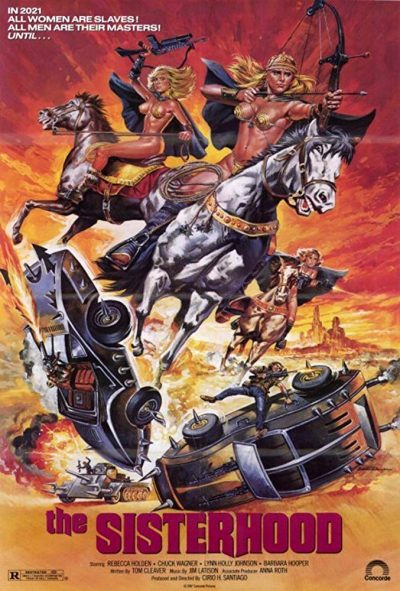 This one may be the origin of the meme, “After the apocalypse, food, water and gasoline are in short supply – but hair-spray will still be plentiful.” For there’s no denying the absolute silliness of this slab of post-apocalyptic nonsense. But it’s still imaginative and energetic enough that my interest was largely sustained. We’re apparently long enough after World War III for it all to have become the stuff of almost-forgotten legend. In the aftermath, the world is now occupied by roaming bands, mostly of men. However, certain women are gifted with special powers, and they have banded together into the titular group, under their reverend mother, and are feared by most as witches.
This one may be the origin of the meme, “After the apocalypse, food, water and gasoline are in short supply – but hair-spray will still be plentiful.” For there’s no denying the absolute silliness of this slab of post-apocalyptic nonsense. But it’s still imaginative and energetic enough that my interest was largely sustained. We’re apparently long enough after World War III for it all to have become the stuff of almost-forgotten legend. In the aftermath, the world is now occupied by roaming bands, mostly of men. However, certain women are gifted with special powers, and they have banded together into the titular group, under their reverend mother, and are feared by most as witches.